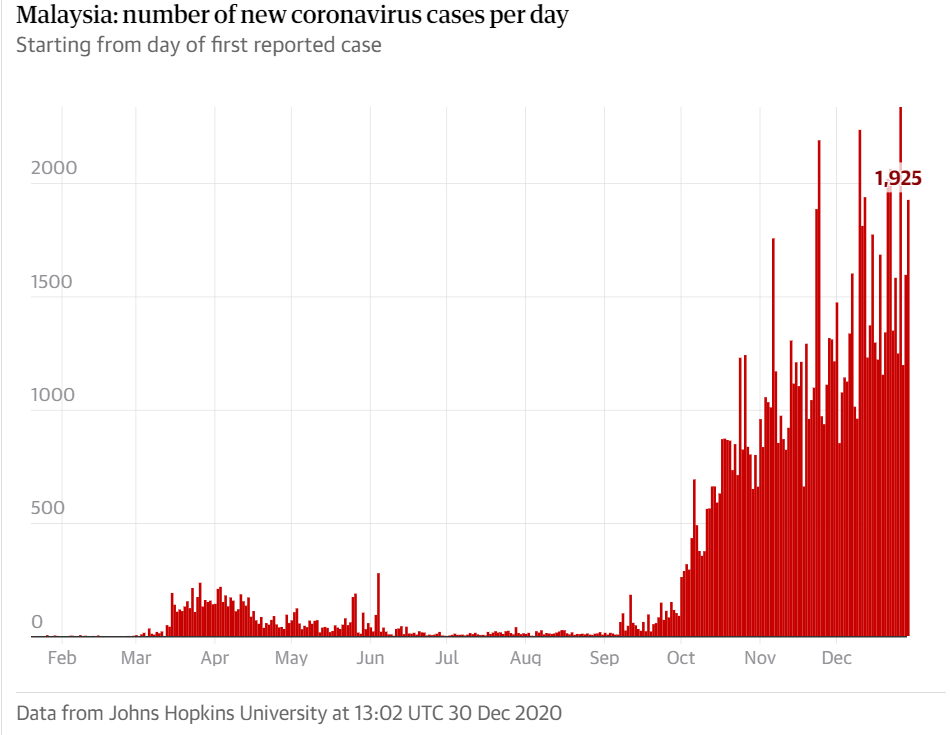
Nepali man is first known fatality at biggest global producer Top Glove, accused of failing to protect workers
A worker at the biggest global producer of medical rubber gloves has died after contracting Covid-19, in the first known Covid-related death of an employee at the Malaysian company since the virus began to spread through its factories and dormitories.
Top Glove’s profits have surged during the pandemic, but the company has faced repeated criticism over its treatment of migrant workers, including claims that it has failed to protect them from the coronavirus.
More than 5,400 people have been infected, many of them Top Glove workers, due to outbreaks at the company’s factories, where workers have warned there is little social distancing.
On Saturday, a 29-year-old worker, originally from Nepal, died after being diagnosed with Covid-19 pneumonia with lung fibrosis. He had worked at Top Glove’s manufacturing facility in Klang, 25 miles (40km) west of the capital, Kuala Lumpur, for more than two years. It is not known whether he contracted the virus at work.
The company, which makes a quarter of the world’s medical latex gloves, has faced multiple allegations of exploitation from migrant workers. Prior to the pandemic, in 2018, the Guardian revealed allegations that workers at the factories were subject to forced labor and overtime, debt bondage, withheld wages, and passport confiscation.
As sales of protective equipment soared over the past year, workers said they have toiled for long hours to meet demand. In April, employees told the Guardian they were not being provided with adequate protection, and that they were working 12-hour shifts, six days a week, with some earning as little as £7 a day.
Workers, who are mostly from Nepal and Bangladesh, also reported that they were sleeping in 24-person dorms, taking crowded buses to work and that social distancing in factories was not maintained.
Top Glove has not yet responded to a request for comment but has previously rejected claims that workers have been mistreated.
Last month the Malaysian government introduced strict movement controls and ordered the staggered closure of Top Glove factories so that workers could be screened and quarantined. The labor department has since said it would file charges against Top Glove over its worker accommodation, which it said was overcrowded and poorly ventilated.
US Customs and Border Protection placed an import ban on two of Top Glove’s subsidiaries in July, following allegations of forced labor, but the company has benefitted from huge demand elsewhere. It reported a net profit of $470m for the financial year ending August – up from $90m the previous year.
In September, the Guardian found that, despite allegations of worker abuses, medical gloves made by the company had been recently supplied to at least one NHS hospital. Top Glove said in a statement at the time that “employee safety, health, and wellbeing have always been of utmost importance” and listed a number of steps it had taken to protect workers during the coronavirus.
Andy Hall, a workers’ rights campaigner, said international buyers and government regulators had “turned a blind eye” to concerns to “ensure faster and cheaper delivery of much-needed PPE during the pandemic”.
The outbreak in Top Glove facilities is another reminder of the vulnerability of migrant workers during the pandemic. Earlier this year, Singapore faced a major outbreak in cramped workers’ dormitories, where people slept on bunk beds with as many as 20 to a room.


